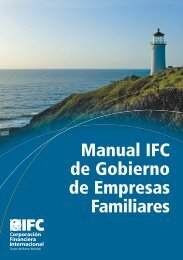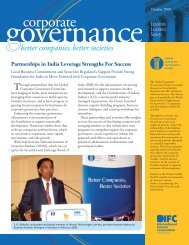SME Finance Policy Guide
SME Finance Policy Guide
SME Finance Policy Guide
You also want an ePaper? Increase the reach of your titles
YUMPU automatically turns print PDFs into web optimized ePapers that Google loves.
G-20 <strong>SME</strong> FINANCE POLICY GUIDE<br />
45<br />
quality of <strong>SME</strong> information, but can also act as a barrier<br />
to <strong>SME</strong> finance and growth. External audits can be costly<br />
and difficult to justify, as <strong>SME</strong> accounting is usually<br />
straightforward, relying on historical cost-based, rather<br />
than fair value, measurement. They may also act as an<br />
incentive to stay disengaged from the formal sector and<br />
full regulatory compliance. 52<br />
International Financial Reporting Standards (IFRS)<br />
have been adapted and streamlined for <strong>SME</strong>s, and<br />
about 60 countries have adopted the <strong>SME</strong> version of<br />
IFRS. However some countries have concluded that the<br />
<strong>SME</strong> version of IFRS is still too costly and burdensome<br />
for local and smaller <strong>SME</strong>s, and have adopted a simpler<br />
set of obligatory standards. There are similar concerns<br />
regarding obligatory auditing. Although auditing<br />
improves the reliability of financial statements, the EU<br />
exempts firms with fewer than 50 employees from<br />
obligatory audits, a rule that also attempts to strike a<br />
balance between the objectives of improving transparency<br />
and reducing the regulatory burden for small<br />
firms. Some studies have found that effective accounting<br />
standards are positively associated with measures<br />
of access, but research in this area has been limited by<br />
the lack of good quantitative indicators of the quality<br />
of financial reporting, and are not focused on <strong>SME</strong>s.<br />
There has been substantial debate around developing<br />
accounting and auditing standards for <strong>SME</strong>s that strike<br />
the right balance between transparency and regulatory<br />
simplicity. <strong>SME</strong>s are typically non-public entities with<br />
simple financial transactions. Many of the disclosures<br />
aimed at public shareholders and lenders may be<br />
unnecessary for <strong>SME</strong>s. Several countries resist adopting<br />
IFRS for <strong>SME</strong>s, claiming that these standards remain<br />
excessively complex and costly for smaller firms.<br />
World Bank research shows that many countries use<br />
company size to determine a company’s financial<br />
reporting and audit requirements, although the relief<br />
that is given tends to be quite limited. Most commonly,<br />
<strong>SME</strong>s are exempted from statutory audit<br />
Global Technology and Innovation<br />
Partners (GTIP)<br />
Diaspora can play a prominent role in introducing and<br />
financing innovation, as has been widely acknowledged<br />
in the case of India and Israel. An emerging example is<br />
the Arab Diaspora links to support <strong>SME</strong> Innovation in the<br />
MENA region. Global Technology and Innovation<br />
Partners (GTIP) is a partnership of successful Arab diaspora<br />
entrepreneurs based in Silicon Valley, targeting<br />
investments across the Middle East, North Africa and<br />
South Asia regions (MENASA). GTIP has recently established<br />
the “Rising Tide Venture Capital Fund” ($250 million<br />
being raised) that will focus on building local<br />
entrepreneurial ecosystems and provide seed, early, and<br />
growth-stage capital for innovative ventures in MENASA<br />
countries. To help ensure the development and acceleration<br />
of successful and innovative start-ups in the region,<br />
GTIP intends to pool their staff, partners, and other successful<br />
entrepreneurs from Silicon Valley, and elsewhere<br />
in the United States to provide companies in MENA with<br />
continuous mentorship and expertise.<br />
GTIP has two key partners to help transfer support and<br />
provide mentorship: Plug and Play Technology Center<br />
(PnP), which is a technology incubator based in Silicon<br />
Valley, and the TechWadi networking association, which<br />
allows GTIP to tap into the Arab diaspora to provide<br />
mentorship and advice to MENA entrepreneurs.<br />
requirements and/or are subjected to simplified<br />
accounting standards. However, the thresholds used<br />
to define <strong>SME</strong>s are often quite low and exempt only<br />
the smallest of companies. There is significant resistance,<br />
often motivated by genuine concerns, within<br />
parts of the accounting and audit profession to the<br />
notion that <strong>SME</strong>s should be afforded greater relief in<br />
their financial reporting and audit obligations. The<br />
benefits of differentiated standards or systems need<br />
to be better understood.<br />
Standards, <strong>Guide</strong>lines and Good Practice<br />
A clear case can be made in favor of simplified accounting<br />
and financial reporting framework for smaller<br />
52 Ibid



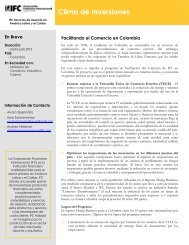
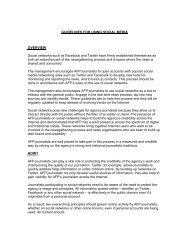
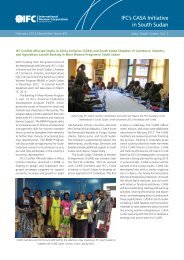
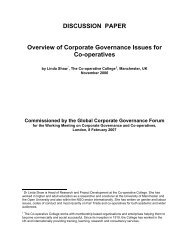
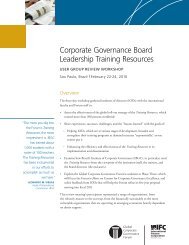
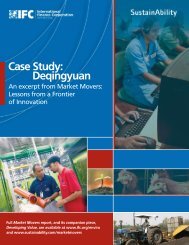
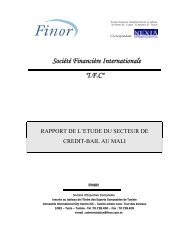
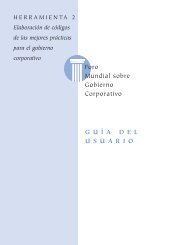
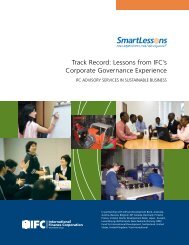
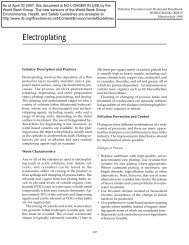

![Print a two-page fact sheet on this project [PDF] - IFC](https://img.yumpu.com/43449799/1/190x245/print-a-two-page-fact-sheet-on-this-project-pdf-ifc.jpg?quality=85)
